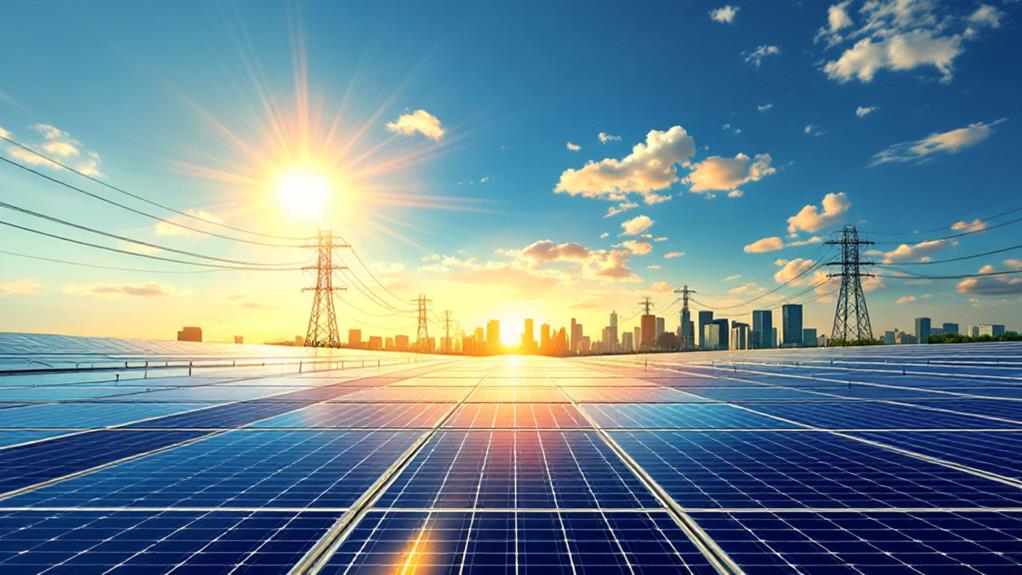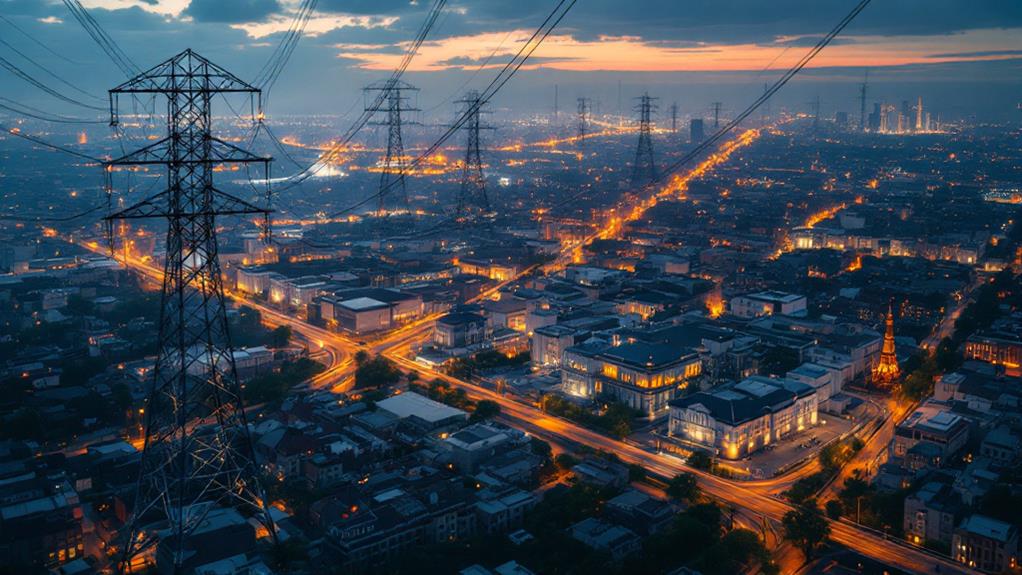What Are the Different Types of Power Generators? A Complete Guide
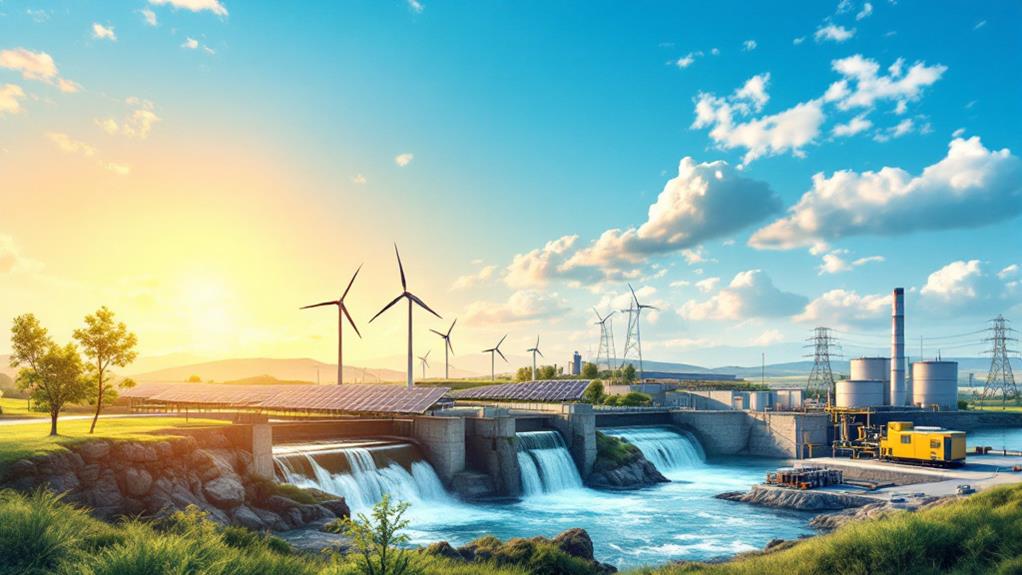
When considering power generators, you'll find a variety of options to suit your needs. Diesel and gasoline generators are popular for their reliability and portability, though they require regular upkeep. Natural gas and propane generators offer cleaner, quieter, and more efficient operation. Looking to renewable sources? Solar, wind, and hydroelectric generators harness natural energies and boast lower emissions. Biomass and hydrogen fuel cell generators further promote sustainability by using organic materials and hydrogen, respectively. For quieter and energy-efficient solutions, inverter generators are perfect for home or outdoor use. Identifying the right generator can improve your energy security and sustainability.
Diesel Generators
Diesel generators are a dependable choice when you need a consistent power source. They're particularly suitable for industrial applications where a steady and robust energy supply is vital. You'll find diesel generators powering construction sites, hospitals, and manufacturing plants, guaranteeing that operations run smoothly without interruptions. Their durability and efficiency make them ideal for heavy-duty tasks, providing the power you need to keep machinery and systems functional.
When using diesel generators, it's significant to follow some fundamental maintenance tips to make certain they remain in top working condition. Initially, regularly check the fuel system for any leaks or blockages, as these can hinder performance and lead to costly repairs. It's also imperative to change the oil and filters at recommended intervals to keep the engine running smoothly. You should inspect the battery and electrical connections for corrosion or damage, assuring reliable starts each time.
Don't forget to run the generator periodically if it's not in constant use. This practice prevents moisture buildup and keeps the engine parts well-lubricated. By following these maintenance tips, you'll extend the life of your diesel generator and enhance its performance in industrial applications.
Gasoline Generators
Choosing gasoline generators offers flexibility and convenience, making them a popular option for both residential and small-scale commercial use. They're ideal for portable applications due to their compact size and ease of transport. However, like any equipment, they require attention to detail in their operation and upkeep.
- Fuel Efficiency and Cost Analysis: Gasoline generators are generally affordable upfront, but fuel efficiency can vary. Regular maintenance, such as changing filters and checking spark plugs, can help optimize their performance and efficiency.
- Noise Levels and Environmental Impact: Gasoline generators tend to be noisier than other types. If noise levels are a concern, consider models with built-in mufflers or noise reduction features. The environmental impact is another factor; they emit more pollutants compared to some alternatives, so use them in well-ventilated areas.
- Safety Precautions and Usage Scenarios: Always follow safety precautions like keeping the generator dry and never using it indoors to prevent carbon monoxide poisoning. Regarding usage scenarios, they're perfect for temporary power needs during outages or powering tools on a job site.
Natural Gas Generators
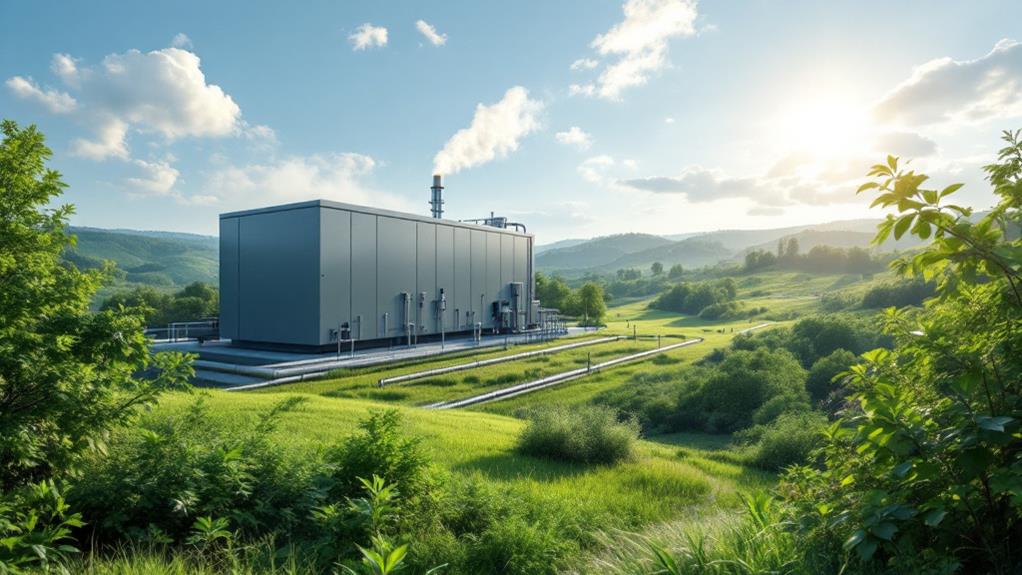
While gasoline generators are popular for their portability, natural gas generators offer a different set of advantages that might align better with your needs. They boast impressive efficiency ratings, making them a cost-effective option over time. When considering installation, you'll need to assess your property's existing gas lines or plan for new ones, which can impact initial costs. However, the convenience of fuel availability is a major perk, as they're connected directly to your home's gas supply, eliminating the need for manual refueling.
Natural gas generators have a lower environmental impact compared to diesel or gasoline options, emitting fewer pollutants. Their maintenance requirements are generally less demanding, saving you time and effort. Regarding load capacity, these generators can handle substantial power needs, making them ideal for larger homes or businesses.
You'll also appreciate their quieter operation, as noise levels are typically lower than other generator types. Safety features are robust, including automatic shut-offs and built-in leak detection. Though they lack portability options due to their fixed installation, the cost analysis often reveals long-term savings. Ultimately, natural gas generators are a reliable, efficient choice for continuous power needs.
Propane Generators
Regarding versatile power solutions, propane generators stand out for their adaptability and efficiency. If you're looking for a reliable backup power source, consider the advantages propane generators offer. They're known for their clean-burning properties, which make them environmentally friendly compared to other fossil fuels. Propane efficiency means these generators can run for longer periods without needing refueling, which is ideal for extended power outages.
When considering a propane generator, you'll appreciate the benefits of propane safety. Propane is non-toxic and doesn't spill or leave residue, reducing environmental hazards. Plus, its sealed storage system minimizes the risk of leaks, ensuring safety for your home and family. Here are three reasons why you might choose a propane generator:
- Fuel Accessibility: Propane is widely available and can be stored for long periods without degradation, unlike gasoline that can go stale.
- Quiet Operation: These generators often run quieter than their gasoline counterparts, reducing noise pollution in your neighborhood.
- Cost-Effectiveness: While the initial investment might be higher, propane's efficiency can save you money in the long run with lower fuel and maintenance costs.
With these benefits, propane generators offer a practical power solution for your needs.
Solar Power Generators
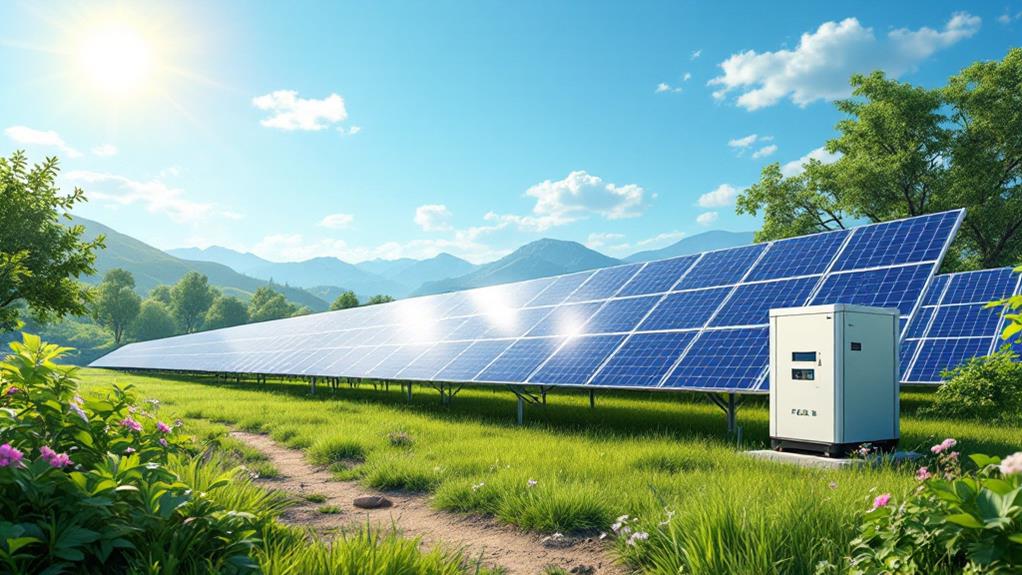
After exploring the benefits of propane generators, it's time to highlight another eco-friendly power solution: solar power generators. These systems harness the sun's energy, transforming sunlight into electricity through solar panels. When choosing a solar power generator, understanding solar panel efficiency is essential. This term refers to how effectively a solar panel converts sunlight into usable electricity. Higher efficiency panels capture more sunlight and generate more power, making them ideal if you're limited on space.
Solar power generators aren't just about panels; solar energy storage plays an important role too. Energy storage systems, like batteries, store excess electricity generated during sunny periods. This stored power guarantees you have a steady supply, even when the sun isn't shining. When selecting a solar power generator, consider the capacity of the energy storage system. This will determine how long you can rely on solar power alone during cloudy days or nighttime.
Incorporating solar power generators into your energy plan reduces your carbon footprint and can potentially lower energy costs over time. They're especially beneficial in remote locations where traditional power sources might be unreliable. Adopt solar power and step into a sustainable future.
Wind Power Generators
Harnessing the natural force of the wind, wind power generators offer a robust and renewable energy solution. When you consider wind power, you're thinking about wind turbines, those tall, elegant structures that capture wind energy and convert it into electricity. Wind turbine efficiency plays a considerable role in how effectively these generators can meet energy demands. The larger and more advanced the turbine, the more electricity it can produce, making them a key player in the renewable energy landscape.
With the development of offshore wind energy, the potential for wind power has expanded dramatically. Offshore locations offer stronger and more consistent winds, which can greatly increase the efficiency and output of wind turbines. If you live near the coast, you might notice the spread of these offshore wind farms, contributing to a cleaner energy future.
Here are three advantages of wind power generators:
- Renewable Resource: Wind is an inexhaustible natural resource, offering a sustainable way to generate electricity without depleting the Earth's resources.
- Low Operational Costs: Once installed, wind turbines incur minimal operating expenses compared to fossil fuel-based energy systems.
- Reduced Carbon Footprint: Using wind power helps decrease greenhouse gas emissions, promoting a healthier environment.
Hydroelectric Generators

Shifting our focus from the windswept landscapes to the flowing waters, hydroelectric generators present another powerful renewable energy source. You might be familiar with the iconic image of a dam harnessing the power of water, but there's more to it than meets the eye. Hydroelectric generators convert the kinetic energy of flowing or falling water into electricity, offering numerous hydroelectric benefits. One major advantage is their ability to provide a stable and reliable power supply, unlike some other renewable energy sources that depend on weather conditions.
When you choose hydroelectric power, you're opting for a clean energy source that doesn't emit harmful pollutants into the atmosphere. It's a renewable energy form that can greatly reduce your carbon footprint. Plus, hydroelectric plants often have long lifespans, making them a cost-effective option in the long run. They also offer the flexibility of adjusting energy output quickly to meet demand, which is vital for maintaining grid stability.
However, it's important to evaluate environmental impacts, such as ecosystem disruption and water flow alteration. Despite these challenges, hydroelectricity remains a key component of a sustainable energy future, providing clean, renewable energy to power our world.
Biomass Generators
Biomass generators, with their roots in organic materials, offer a unique and adaptable approach to renewable energy. By utilizing waste products like wood chips, agricultural residues, and even food waste, these generators transform what was once discarded into valuable energy. This not only helps reduce landfill waste but also contributes considerably to sustainability benefits. You might find biomass generators particularly appealing if you're looking to lower your carbon footprint and support a circular economy.
When considering biomass generators, keep in mind these key points:
- Sustainability Benefits: Biomass energy is renewable and can be replenished as long as there's an ongoing supply of organic materials. This guarantees a continuous energy source that aligns with environmental goals.
- Operational Efficiency: Modern biomass generators are designed to optimize energy output while minimizing waste. Technological advancements have made them more efficient, assuring you get the most power from the least amount of raw material.
- Adaptability: Biomass generators can be used in numerous settings, from small-scale residential applications to large industrial plants. This flexibility makes them suitable for different needs and locations, offering a tailored solution for energy production.
Hydrogen Fuel Cell Generators

Have you ever wondered about the potential of hydrogen fuel cell generators? They're an exciting technology transforming how we think about power generation. Fundamentally, these generators convert hydrogen into electricity through a chemical reaction, not combustion, making them a cleaner alternative to traditional fossil fuels. The process relies on hydrogen production, which can be achieved through different methods, including electrolysis and steam methane reforming.
One of the standout features of hydrogen fuel cell generators is their fuel cell efficiency. Unlike internal combustion engines that waste a large amount of energy as heat, fuel cells can achieve efficiencies of 60% or more. This means they extract more usable energy from the same amount of hydrogen compared to conventional methods. Plus, the only byproducts are water and heat, making them an environmentally friendly choice.
For you, this means a reliable, sustainable power source that reduces your carbon footprint. Regardless of whether you're considering them for residential use or larger commercial applications, hydrogen fuel cell generators offer a glimpse into a cleaner, more efficient future. Investigate their potential, and you might find they're the perfect fit for your energy needs.
Inverter Generators
Why are inverter generators becoming a popular choice for both homeowners and outdoor enthusiasts? It's all about their portability features, efficiency, and quieter operation. If you're looking for a generator that doesn't weigh you down, inverter generators are designed with compactness in mind, making them easy to transport during camping trips or outdoor events. Let's break down the reasons why they're a top pick:
- Portability Features: Unlike traditional generators, inverter generators are lightweight and often come with handles or wheels, allowing for easy movement and storage.
- Noise Levels: Inverter generators operate at lower noise levels compared to conventional models. This is a significant advantage if you're planning on using them in residential areas or campsites where peace and quiet are appreciated.
- Fuel Efficiency: These generators adjust their engine speed based on the power demand, which improves fuel efficiency and reduces emissions. This means you'll spend less on fuel and contribute less to environmental pollution.
Inverter generators provide a reliable power source without the bulk and noise of traditional models. They're perfect for anyone needing portable, efficient, and quiet power, regardless of being at home or in the great outdoors.
